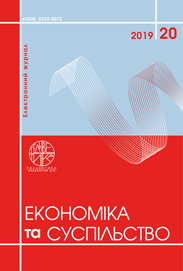OWN CAPITAL AND ITS INFLUENCE ON THE DEVELOPMENT OF DOMESTIC SCIENCE
Abstract
The article deals with the economic and legal essence of the notion of “equity” and its evolution in world and domestic science. The essence of the category “equity of the enterprise” has been specified as an object of accounting in terms of different economists and proposed its structure in terms of sources of formation in the process of economic activity of the enterprise. The article deals with the economic and legal essence of the notion of “equity” and its evolution in world and domestic science. Equity represents the share of the property of an enterprise, which is funded by the owners and own funds of the enterprise. For a long time in the domestic theory and practice, the issue of financing the activities of economic structures at the expense of the owners’ capital was paid extremely attention, but own capital as an economic category has become widespread in the system of financial management of the company, which is the basis of the mechanism for managing its finances. Equity is the financial basis for the creation and development of an enterprise of any form of ownership and organizational and legal form. Also, the essence of the category “equity of the enterprise” as an object of accounting in terms of different scholars-economists is specified and its structure is proposed in the context of the sources of formation in the process of economic activity of the enterprise. In our view, the problem of adequate reflection of equity is important both from a scientific and a practical point of view. For example, in agricultural enterprises, for the most part, at all, attention is not given to ensuring the accuracy of the reflection in the accounting of the real amount of its own capital, which is a stereotype inherited from the command-and-control economy. The transition to a market economy, the exit of Ukraine into international markets, crisis management is accompanied by an objective need to increase autonomy, innovations and development of enterprises of various forms of ownership, including mass creation of joint stock companies. Such a transformation of the economy radically changed the conditions of functioning of business entities, which led to the problems associated with ensuring the stability and stability of enterprises. The basis of steady growth and financial stability of each enterprise is equity, and the main source where the necessary information is stored and systematized are accounting. Issues of accounting and reporting in equity reporting at the present stage of market economy development are the most important economic problems, allowing internal and external users of accounting to determine the financial capabilities of the enterprise in the short-term and long-term perspective.
References
Сук Л.К., Сук П.Л. Фінансовий облік. Київ : Знання, 2012. 647 с.
Гуренко Т.О. Сучасний погляд на власний капітал. Вісник НУБіП. 2013. № 20. URL: http://nubip.edu.ua/sites/default/files.
Хмелевська А.В., Незборецька Г.М. Власний капітал за атрибутами об’єкту бухгалтерського обліку. Сталий розвиток економіки. 2011. № 4. С. 192–194.
Пилипенко О.І. Облік та аналіз власного капіталу: теорія і практика : автореф. дис. … канд. екон. наук : спец. 08.06.04 «Бухгалтерський облік, аналіз та аудит». Київ, 2005. 20 с.
Вівчар О.Й., Саварин В.М. Власний капітал як фінансове джерело функціонування підприємства. Нау¬ковий вісник НЛТУ України. 2009. Вип. 19.5. С. 146–150.
Вівчар О.Й. Власний капітал як фінансове джерело функціонування підприємства. Науковий вісник НЛТУ України. 2009. Вип. 19 (5). С. 146–150.
Петренко Н.І. Бухгалтерський облік і контроль операцій з руху пасивів підприємства: проблеми теорії, методології, практики. Житомир : ЖДТУ, 2012. 544 с.
Надбережна Т.А. Вплив структуризації власного капіталу на організацію бухгалтерського обліку. Еконо¬мічні науки. 2010. № 15 (1). URL: http://www.nbuv.gov.ua/ujrn/soc_gum/Evu/2010_15_1/Nadber.pdf.
Національне положення (стандарт) бухгалтерського обліку 1 «Загальні вимоги до фінансо¬вої звітності» : затверджене Наказом Міністерства фінансів України від 7 лютого 2013 р. № 73 URL: http://zakon4.rada.gov.ua/laws/show/z0336-13.
Шара Є.Ю. Фінансовий облік ІІ. Київ : Центр учбової літератури, 2012. 408 с.
Бугай О.В. Особливості використання сучасних інформаційних технологій в обліку власного капіталу підприємства. Облік, аналіз та аудит: еволюція, сучасний стан та перспективи розвитку : збірник мате¬ріалів Всеукраїнської студентської науково практичної конференції (Київ, 9 грудня 2014 р.). Київ : КНЕУ, 2014. С. 343–345.
Suk L.K. Finansovyi oblik / L.K. Suk, P.L. Suk. – K. : Znannia, 2012. – 647 s.
Hurenko T.O. Suchasnyi pohliad na vlasnyi kapitalVisnyk NUBiP. – 2013. – № 20. URL: http://nubip.edu.ua/sites/default/files.
Khmelevska A.V. Vlasnyi kapital za atrybutamy obiektu bukhhalterskoho obliku / A.V. Khmelevska, H.M. Nezboretska. Stalyi rozvytok ekonomiky. – 2011. – № 4. – S. 192–194.
Pylypenko O.I. Oblik ta analiz vlasnoho kapitalu: teoriia i praktyka: avtoref. dys. na zdobuttia nauk. stupenia kand. ekon. nauk 08.06.04 ―Bukhhalterskyi oblik, analiz ta audyt / O.I. Pylypenko. – K., 2005. – 20 s.
Vivchar O.Y. Vlasnyi kapital yak finansove dzherelo funktsionuvannia pidpryiemstva / O.Y. Vivchar, V.M. Savaryn. Naukovyi visnyk NLTU Ukrainy. – 2009. – Vyp. 19.5 – S. 146–150.
Vivchar O.Y. Vlasnyi kapital yak finansove dzherelo funktsionuvannia pidpryiemstva / O.Y. Vivchar. Nauk. visn. NLTU Ukrainy. – 2009. – Vyp. 19 (5). – S. 146–150.
Petrenko N.I. Bukhhalterskyi oblik i kontrol operatsii z rukhu pasyviv pidpryiemstva: problemy teorii, metodolohii, praktyky / N.I. Petrenko. – Zhytomyr : ZhDTU, 2012. – 544 s. 8. Nadberezhna T.A. Vplyv strukturyzatsii vlasnoho kapitalu na orhanizatsiiu bukhhalterskoho obliku / T.A. Nadberezhna. Ekonomichni nauky. – 2010. – № 15 (1). URL: http://www.nbuv.gov.ua/ujrn/soc_gum/Evu/2010_15_1/Nadber.pdf.
Natsionalne polozhennia (standart) bukhhalterskoho obliku 1 “Zahalni vymohy do finansovoi zvitnosti”, zatverdzhene Nakazom Ministerstva finansiv Ukrainy № 73 vid 07.02.2013 r. URL: http://zakon4.rada.gov.ua/laws/show/z033613.
Shara Ye.Yu. Finansovyi oblik II / Ye.Yu. Shara. – K. : Tsentr uchbovoi literatury, 2012. – 408 s.
Buhai O.V. Osoblyvosti vykorystannia suchasnykh informatsiinykh tekhnolohii v obliku vlasnoho kapitalu pidpryiemstva / O.V. Buhai. Oblik, analiz ta audyt: evoliutsiia, suchasnyi stan ta perspektyvy rozvytku : zbirnyk materialiv Vseukrainskoi studentskoi naukovo praktychnoi konferentsii. Kyiv, 9 hrudnia 2014 r. K. : KNEU, 2014. – S. 343–345.


